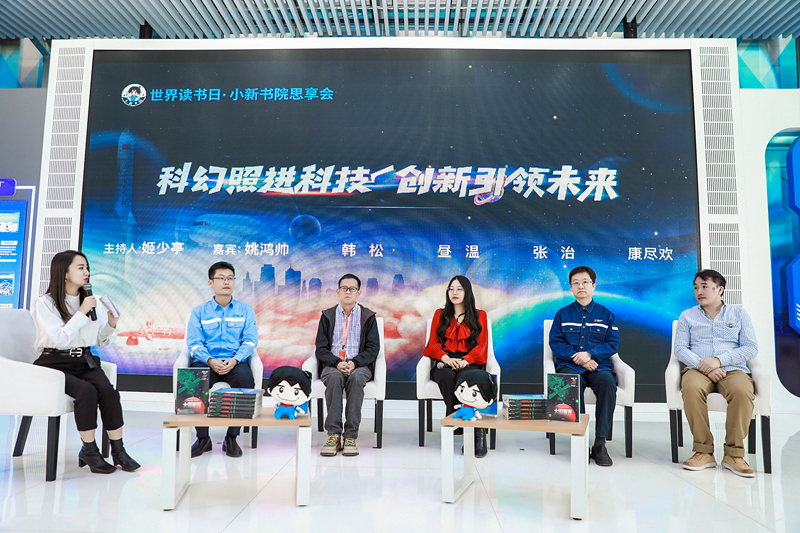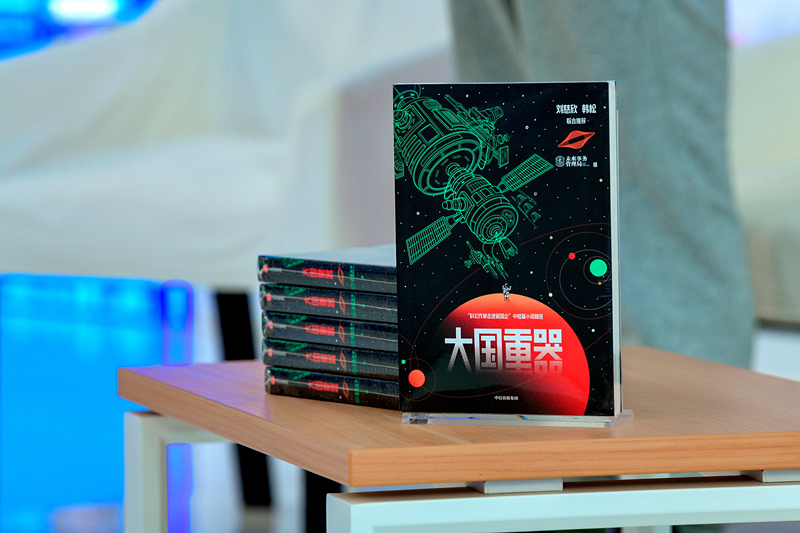Forum on how sci-fi interacts with Chinese sci-tech pillars
- By Zhang Rui
 0 Comment(s)
0 Comment(s) Print
Print E-mail China.org.cn, April 26, 2022
E-mail China.org.cn, April 26, 2022
At a forum held at the China National Nuclear Corporation (CNNC) on April 22, scientists and sci-fi writers came together to discuss the intersection of sci-fi and sci-tech. One of the topics discussed was "The Pillars of A Great Power," a soon-to-be-published collection of 13 science fiction stories inspired by key Chinese sci-tech projects such as China's space exploration, advanced nuclear power reactors and photovoltaic power program.
The stories, written by renowned Chinese sci-fi writers including Wang Jinkang, Jiang Bo and Zhou Wen, was recommended by conference attendees, who also stated they are looking forward to a brighter future brought by sci-tech innovations.

The book is the result of a campaign organized by the news center of the State-owned Assets Supervision and Administration Commission of the State Council (SASAC), and co-organized by the Future Affairs Administration, an incubator of sci-fi works and talents, as well as Sina Weibo, Guokr, and the Global Times. Together, they invited sci-fi and popular science writers to tour several central state-owned enterprises, such as the SASAC, the State Power Investment Corporation (SPIC), the State Grid Corporation of China (SGCC), China State Railway Group (CR) and China Railway Construction Corporation (CRCC). The visits were intended to help them find inspiration to create science fiction based on their own experiences of China's significant national sci-tech projects and programs as well as innovative technologies.
Yan Yong, deputy director of the news center of SASAC, said when sci-fi meets sci-tech, it can help stimulate the innovation vitality of central enterprises and creates new possibilities for a better life for the people of the future. "The pillar projects of China have brought creative inspiration to sci-fi writers, while sci-fi works have given unlimited imagination space for technological innovations," Yan said.
Wu Wei, director of the publicity and culture center of CNNC discussed how the internal cultural mechanism represented by sci-fi promotes the technological innovation of enterprises, and believes that science fiction can inspire thinking ability, innovation ability, and cultivate innovation.
"The stunning feeling brought to us by many sci-fi novels is actually the recurrence and extension of the spiritual experience when facing the miracles of human technology," said Liu Cixin, one of China's most famous sci-fi writers, who attended the event via video link. He said the new book collection of sci-fi stories is the result of writers who have experienced China's most advanced and grand sci-tech projects, "and they bring the upcoming future visions to us."
At the forum, sci-fi writer Zhou Wen recalled her personal experience of walking into the photovoltaic industrial park of the State Power Investment Corporation in Qinghai, and later conceived of a high-sensitivity optoelectronic material used for space flight in her novel. Zhang Zhi, a senior engineer of SPIC, echoed that such sci-fi ideas are very likely to be realized in the near future, and some have already become a reality: "In addition to sunlight, we can also obtain energy by harnessing cosmic rays in the universe, which will be the best source of energy for any future interstellar journey."
When talking about innovative thinking, Yao Hongshuai, a senior engineer of China Nuclear Power Engineering Co. Ltd., who is a big sci-fi fan, added that at the forum, the imagination of sci-fi inspired the innovative ideas of sci-tech workers in central enterprises in real work scenarios.
In 2020, CNNC started to pay more attention to sci-tech cultural aspects by launching a sci-fi content franchise to attract public interest in nuclear technologies. Also on April 22, CNNC announced in a Weibo microblog post that they are developing a nuclear-powered pet dog "Mido" under the franchise, which generated lots of positive feedback.

"Whether it is about sci-fi creation or scientific research, or even in the exploration of the universe, only by knowing where we are can we know who we are and where we are going," said Ji Shaoting, founder of the Future Affairs Administration. She added that it is of great importance for Chinese sci-fi literature creators to be able to understand the real development stage of national innovation and to imagine a step forward based on this.
Han Song, another prominent Chinese sci-fi writer, pointed out the cooperation between central state-owned enterprises and sci-fi writers to popularize science and spread knowledge through sci-fi works has strong practical significance for improving national innovation ability and scientific literacy, as well as boosting China's scientific and technological confidence and cultural confidence.
"Albert Einstein had said that imagination is more important than knowledge. Sci-fi writers imagine various miracles from China's economic development in the future, which provide strong inspiration and enlightenment for us to speed up the construction of an innovative country and enhance our international competitiveness," Han said.






Go to Forum >>0 Comment(s)